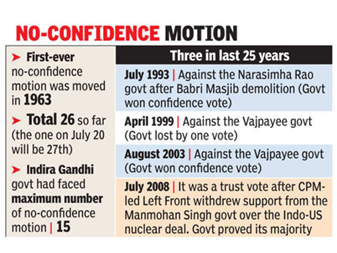Why in News?
- Lok Sabha Speaker Om Birla has admitted a no-confidence motion against the ruling government.
- The motion was proposed by Congress MP Gaurav Gogoi, on behalf of opposition parties of I.N.D.I.A alliance.
What’s in Today’s Article?
- About No-Confidence Motion (Meaning, Working, Who can Move, Instances, etc.)
What is a No-Confidence Motion?
- In a parliamentary democracy, a government can be in power only if it commands a majority in the directly elected House.
- Article 75(3) of the Indian Constitution embodies this rule by specifying that the Council of Ministers are collectively responsible to the Lok Sabha.
- For testing this collective responsibility, the rules of Lok Sabha provide a particular mechanism – a motion of no-confidence.
- The procedure is specified under Rule 198 of the Lok Sabha.
- The Constitution does not mention either a Confidence or a No Confidence Motion.
Who can move a No-Confidence Motion?
- Any Lok Sabha MP, who can garner the support of 50 colleagues, can, at any point of time, introduce a motion of no-confidence against the Council of Ministers.
- A no-confidence motion can be moved only in the Lok Sabha. It cannot be moved in the Rajya Sabha.
How is a No-Confidence Motion Debated and Voted?
- The motion is moved by the member who submitted it, and the government will then respond to the motion.
- The opposition parties will then have the opportunity to speak on the motion.
- After the debate, the Lok Sabha will vote on the no-confidence motion.
- The motion will be passed if it is supported by a majority of the members of the House.
- If a no-confidence motion is passed, the government must resign.
- If the government wins the vote on the no-confidence motion, the motion is defeated and the government remains in power.
How many No-Confidence Motions have been introduced since Independence?

- There have been 27 no-confidence motions introduced in the Lok Sabha since independence
- The first no-confidence motion against the administration of the then PM Jawaharlal Nehru was presented in the Lok Sabha in August 1963.
- The motion obtained only 62 votes in favor and 347 votes against it.
- The last no-confidence motion was moved in 2018 against the then NDA government.









